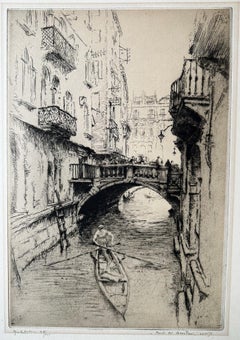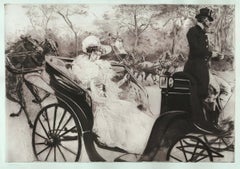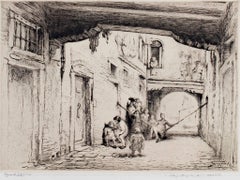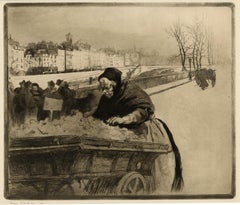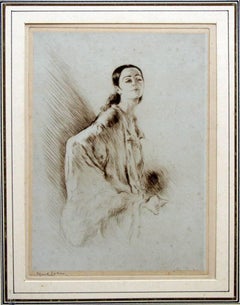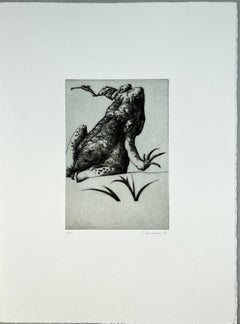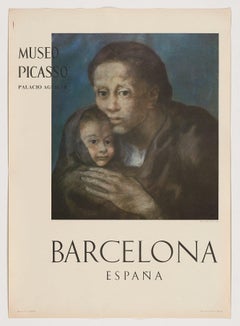Edgar Chahine Figurative Prints
Edgar Chahine was born in Vienna, Austria to Armenian parents. At age 21, he decided to travel to Paris and pursue a career in fine arts. He studied painting under formal instruction at the Académie Julian, but his natural ability and his determination to express himself as an artist led him to a personal style based more on the reality of the streets of Paris than the confines of the classroom. Chahine began to experiment with the possibilities of printmaking at the age of 25. Although he had already achieved some success with his paintings, he became fascinated with prints and soon worked exclusively in this medium. His prints were very much in demand by collectors and the well known publisher Edmond Sagot quickly became his dealer. He won several medals and awards and received many commissions. Chahine's print œuvre is an equal representation of elegant Parisian men and women, Bourgeois society and more common scenes of country fairs and street life. His sympathetic depictions of children, beggars, circus performers and other often forgotten people were engaging and touched the emotions of the observer, while his portrayals of the more fashionable side of Paris accurately captured its "joie de vivre". The death of his fiancé plunged him into a deep depression, and he left Paris to travel through Italy. This voyage gave him the serenity and the inspiration to begin working with new enthusiasm, etching the day's drawings onto copper plates in his hotel room each night. He returned with new vigor and expanded his efforts to once again include pastels and oils in his work. This productivity was not to last, as the combination of terrible events in Armenia and Syria and the outbreak of World War I rendered Chahine unable to work. Not until his marriage in 1921 did he begin to make art again. In 1925, he became a French citizen and began a new burst of creative activity in fine prints and illustrated books. Many of Chahine's prints were lost in a fire in his atelier in 1926, and many more were destroyed in a flood in 1942.
Early 20th Century French School Edgar Chahine Figurative Prints
Handmade Paper, Drypoint, Etching
Early 1900s Expressionist Edgar Chahine Figurative Prints
Engraving
Early 1900s Art Nouveau Edgar Chahine Figurative Prints
Drypoint, Etching, Aquatint
1920s Modern Edgar Chahine Figurative Prints
Etching
Early 20th Century Post-Impressionist Edgar Chahine Figurative Prints
Handmade Paper, Rag Paper, Drypoint, Etching
Early 1900s Edgar Chahine Figurative Prints
Etching
20th Century Edgar Chahine Figurative Prints
Etching
1980s Contemporary Edgar Chahine Figurative Prints
Paper, Engraving, Etching, Aquatint
1960s Expressionist Edgar Chahine Figurative Prints
Offset
Early 1900s Art Nouveau Edgar Chahine Figurative Prints
Drypoint, Etching
20th Century American Modern Edgar Chahine Figurative Prints
Drypoint, Etching
19th Century American Modern Edgar Chahine Figurative Prints
Etching, Drypoint
1880s Post-Impressionist Edgar Chahine Figurative Prints
Drypoint, Etching
20th Century American Modern Edgar Chahine Figurative Prints
Etching, Drypoint
Early 20th Century Modern Edgar Chahine Figurative Prints
Drypoint, Etching
20th Century American Modern Edgar Chahine Figurative Prints
Drypoint, Etching
1930s Modern Edgar Chahine Figurative Prints
Drypoint, Etching
20th Century American Modern Edgar Chahine Figurative Prints
Drypoint, Etching
Late 20th Century Expressionist Edgar Chahine Figurative Prints
Lithograph
1910s Edgar Chahine Figurative Prints
Drypoint
1920s Realist Edgar Chahine Figurative Prints
Drypoint
1910s Realist Edgar Chahine Figurative Prints
Drypoint
Early 20th Century Impressionist Edgar Chahine Figurative Prints
Drypoint, Etching
